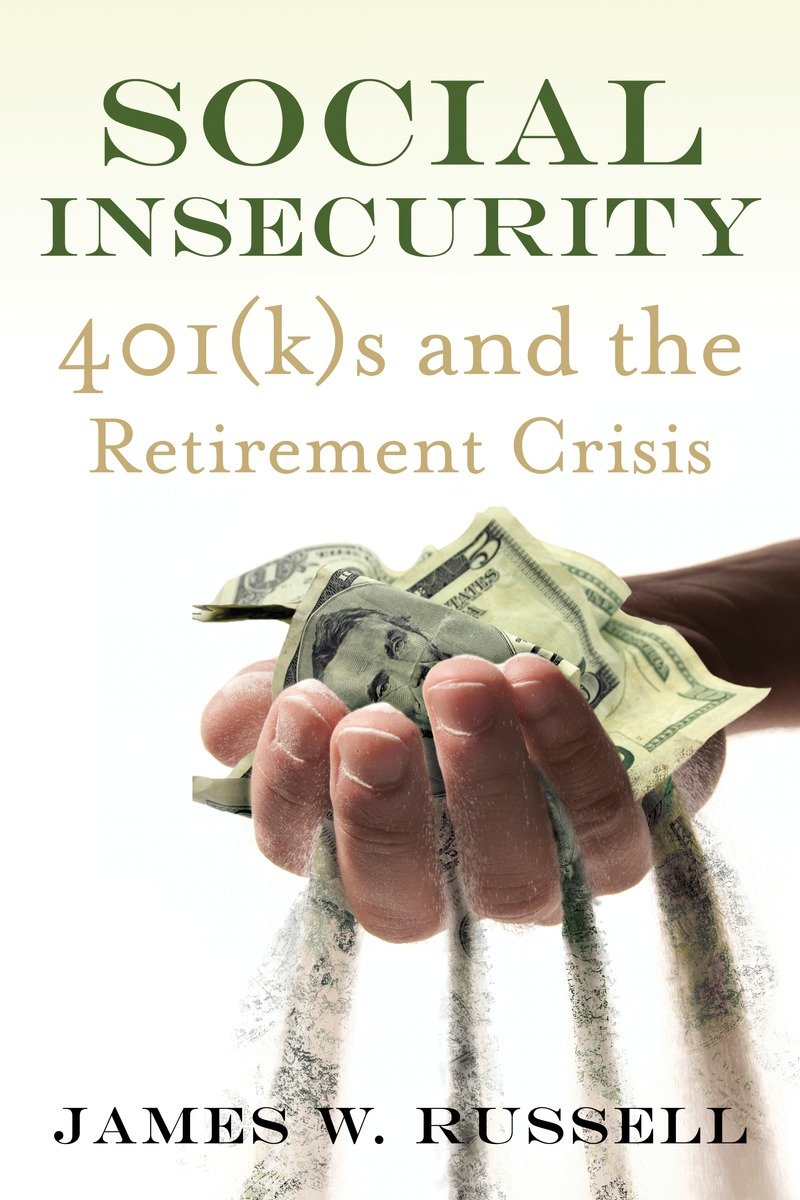Social Insecurity: 401(k)s and the Retirement Crisis
22.00 JOD
Please allow 2 – 5 weeks for delivery of this item
Add to Gift RegistryDescription
How 401(k)s have gutted retirement security, from charging exorbitant hidden fees to failing to replace the income of traditional pensionsNamed one of PW’s Top 10 for Business & Economics A retirement crisis is looming. In 2008, as the 401(k) fallout rippled across the country, horrified holders watched 25 percent of their funds evaporate overnight. Average 401(k) balances for those approaching retirement are too small to generate more than $4,000 in annual retirement income, and experts predict that nearly half of middle-class workers will be poor or near poor in retirement. But long before the recession, signs were mounting that few people would ever be able to accumulate enough wealth on their own to ensure financial security later in life. This hasn’t always been the case.Each generation of workers since the nineteenth century has had more retirement security than the previous generation. That is, until 1981, when shaky 401(k) plans began replacing traditional pensions. For the last thirty years, we’ve been advised that the best way to build one’s nest egg is to heavily invest in 401(k)-type programs, even though such plans were originally designed to be a supplement to rather than the basis for retirement. This financial experiment, promoted by neoliberals and aggressively peddled by Wall Street, has now come full circle, with tens of millions of Americans discovering that they would have been better off under traditional pension plans long since replaced. As James W. Russell explains, this do-it-yourself retirement system—in which individuals with modest incomes are expected to invest large sums of capital in order to reap the same rewards as high-end money managers—isn’t working. Social Insecurity tells the story of a massive and international retirement robbery—a substantial transfer of wealth from everyday workers to Wall Street financiers via tremendously costly hidden fees. Russell traces what amounts to a perfect swindle, from its ideological origins at Milton Friedman’s infamous Chicago School to its implementation in Chile under Pinochet’s dictatorship and its adoption in America through Reaganomics. Enraging yet hopeful, Russell offers concrete ideas on how individuals and society can arrest this downward spiral.
Additional information
| Weight | 0.48124 kg |
|---|---|
| Dimensions | 2.3114 × 15.8496 × 23.4188 cm |
| Author(s) | |
| Format Old` | |
| Language | |
| Pages | 224 |
| Publisher | |
| Year Published | 2014-4-29 |
| Imprint | |
| Publication City/Country | USA |
| ISBN 10 | 0807012564 |
| About The Author | James W. Russell is the author of eight books, including Double Standard: Social Policy in Europe and the United States. An authority on retirement policy in the United States, Europe, and Latin America, Russell led one of the first employee movements to successfully challenge the dominant trend and replace a 401(k)-like plan with a more secure traditional pension plan. He has taught at universities in the United States and as a Fulbright professor in Mexico and the Czech Republic. He lives in Storrs, Connecticut. |
“This is the story of how one individual fought bureaucracy—and won…. His campaign is truly a case history to be emulated, one that requires much patience and time.”—Booklist“Retirement expert Russell (Double Standard) offers a sobering and persuasive analysis of the gradual shift from more secure defined-benefit plans (pensions) to riskier defined-contribution plans (401(k)s). When he retired at age 65, Russell should have had 70%–100% of his final salary as income, according to conventional wisdom, but despite a frugal lifestyle, he had only 45%–50% of his income, between his 401(k) and projected Social Security. Russell suggests that confusion about retirement saving leads average Americans to become the victims of a swindle perpetrated by think tanks and the financial services industry. He explains how popular economic theory, led by Milton Friedman’s Chicago School, turned against Social Security, and traces changes during the Reagan administration, when more companies switched from pensions to 401(k)s. Russell led a successful movement in his own company to switch back to pensions. As he notes, there’s now an international movement to go back to a plan where most retirement income is bolstered by pensions and Social Security—“the most successful retirement program by far in terms of the number of people who have benefited.” He closes with suggestions for how to put that plan into effect. The book is a hair-raising look at the dire retirement prospects of tens of millions of Americans.” —Publishers Weekly“Russell (Double Standard) argues that defined-benefit pension plans are substantially better for both employees and employers than defined-contribution 401(k)-type retirement ones. The author's message is that 401(k) plans are essentially scams that mainly benefit the financial services industry through the various fees that are charged. Having led, in Connecticut, one of the first successful employee movements to replace a state's 401(k)-like retirement plan with a pension plan, Russell offers a unique view. In addition to recounting the experiences of the Connecticut Committee for Equity in Retirement, the author covers historical events that brought about changes to retirement policy in the United States. The book is full of statistics and useful tables that help readers to digest this complicated topic. Russell encourages readers to avoid the retirement pitfalls he writes about by learning as much as they can about the different systems, which he admits are confusing for most people, and suggests ways to do so. He argues that education on the topic is key. VERDICT Essential for anyone interested in the evolvement of retirement systems and how these changes affect their own retirement.”—Library Journal“Labor educators will welcome his call for advocacy to address the looming economic challenges that confront workers nearing retirement age. Russell shines a light on the real consequences of the transition away from traditional ‘defined benefit’ pensions (funded by employers) to the ‘defined contribution’ model, or 401(k), funded primarily by employees.”—Labor Studies Journal“In Russell’s well-researched, well-documented view, 401(k)s are essentially financial snake oil sold to a gullible public on the basis of false promises of steadily rising value…Russell demonstrates the pitfalls of relying on 401(k)s especially ably and succinctly…a valuable primer that provides a useful framework for analysis in a popular, deeply informative form.”—Science & Society“Experts and lay people alike will be deeply enlightened by reading Social Insecurity: 401(k)s and the Retirement Crisis, an incisive and compelling account of the harm caused by the disastrous jump into 401(k) plans as a major source of Americans’ retirement income. Professor James W. Russell places the trend towards 401(k) plans in an international perspective. His description of how Connecticut public employees successfully forced the state to allow them to switch from their 401(k)-type plan to the much more effective traditional pension plan is a fascinating tale. That victory by workers should serve as inspiration and a model for other workers who lack access to a traditional pension. The book is a must read for everyone concerned about the looming retirement income crisis facing the nation as well as their own ability to someday retire with financial security and independence.”—Nancy J. Altman, co-founder, Social Security Works!“James Russell is a formidable crusader with a gift for rendering an obtuse topic accessible. In Social Insecurity, he has penned a book that will enrage citizens of all ages and political persuasions, illuminate them about the organized robbery of their economic futures by the financial services industry, and inspire them to action. More than a description of a retirement system coopted by predatory bankers and fund managers, Social Insecurity is also a passionate account of the complicity of the global political elite and their ideological zealots, complete with a Hollywood moment of Russell’s victory in achieving reform measures that can benefit everybody.” —Nomi Prins, author of All the Presidents' Bankers and It Takes a Pillage“Forget the TV ads of gray-haired retired couples on bicycle trips. If you’re an average American, you won’t have enough to retire on. The shift from old-fashioned pensions to 401(k)s has enriched Wall Street and jeopardized your future. Essential reading for anyone who works for a living—from millennials to boomers—James Russell’s Social Insecurity explains what you lost and who benefited from it.”—Charles R. Morris, author of The Two Trillion Dollar Meltdown and The Tycoons“An absolutely necessary read! James Russell has written the book explaining how we all got sold on the ridiculous notion of do-it-yourself retirement savings, and why it was never, ever going to work for anyone but the financial services sector. A devastating indictment that nevertheless concludes with ideas for reversing a dangerous trend we can no longer afford to ignore.”—Helaine Olen, author of Pound Foolish: Exposing the Dark Side of the Personal Finance Industry“You really can’t understand inequality in America today, James Russell helps us see, without understanding how Wall Street has grabbed a chokehold on our retirement savings system. We’re not ‘saving for retirement’ anymore. We’re enriching the 1 percent. Informative and stimulating, Social Insecurity offers us a sobering tale about a financial experiment gone terribly wrong—and some great ideas on what we can do to change how this story ends.”—Sam Pizzigati, author of The Rich Don’t Always Win: The Forgotten Triumph over Plutocracy that Created the American Middle Class, 1900-1970 |
|
| Table Of Content | PREFACE CHAPTER 1 Before the SwindleCHAPTER 2 A Fix for What Wasn’t BrokenCHAPTER 3 Army Tanks and Think TanksCHAPTER 4 Targeting Social Security and Public Worker PensionsCHAPTER 5 How 401(k)s Are Supposed to Work and Why They Don’tCHAPTER 6 A Model UnravelsCHAPTER 7 Turmoil in the Land of Steady HabitsCHAPTER 8 What We Can Do Acknowledgments Notes Index |
Only logged in customers who have purchased this product may leave a review.






Reviews
There are no reviews yet.